This article covers Korean labor rights for expats.
It includes:
- What benefits you’re entitled to
- How much notice a company needs to give
- Where to get help if you need it
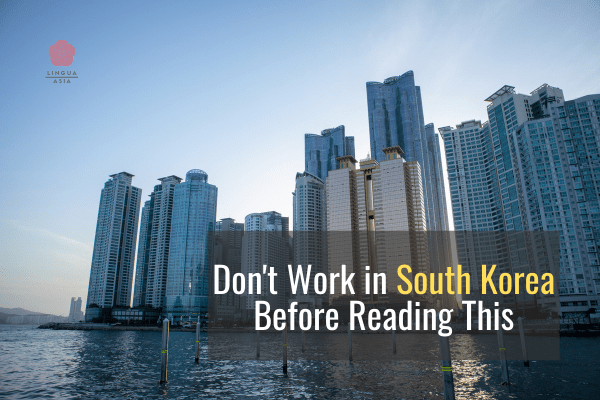
Quick Summary
- Labor contracts are mandatory.
- Your employer is legally obligated to provide four kinds of insurance, including, health, employment, pension, and occupational health and safety.
- You can get one month’s severance pay for every year worked at a company regardless of nationality or labor status.
Korea labor rights have improved by leaps and bounds in the last decade. It’s a good idea to be aware of what you are and aren’t entitled to.
*** Disclaimer ***
The information in this post is correct as of May, 2021. This post is not intended as legal advice. Korean Labor Laws change frequently. Consult a lawyer who specializes in Korean Labor Law when in doubt.
Key Korean Labor Laws
Every citizen has the right to work in South Korea.
There are no work permits in South Korea, you need a visa to work.
Discrimination based on:
- gender
- religion
- political views
- nationality or region of origin
- social status
- family background
- marital status
- maternity
- age
- disability
- full/part time status
- sexual orientation
- appearance
is illegal according to the LSA (Labour Standards Act) and subsequent legislation.
Preferential treatment for men of national merit (military and police officers), their families, disabled people, women, the elderly (above 55 years) and youths (15-29) is legal and not included in the above.
Medical exams and drug testing for employment are legal, but employers must inform applicants of the purpose of collection and use. Applicants must then give consent for any data collection.
The use of profile pictures on resumes is legal and common practice in South Korea, but you can’t be discriminated against based on your appearance.
Employers can’t dismiss employees without reason. The employer must prove that the employee will continue to be an undue burden on the company.
Employers are liable for damages caused by employees short of criminal negligence. Employers will not face criminal sanctions if they took measures to prevent the offenses from occurring.
Employers must maintain and improve the health and safety of their workers according to the ISHA (Industrial Safety and Health Act).
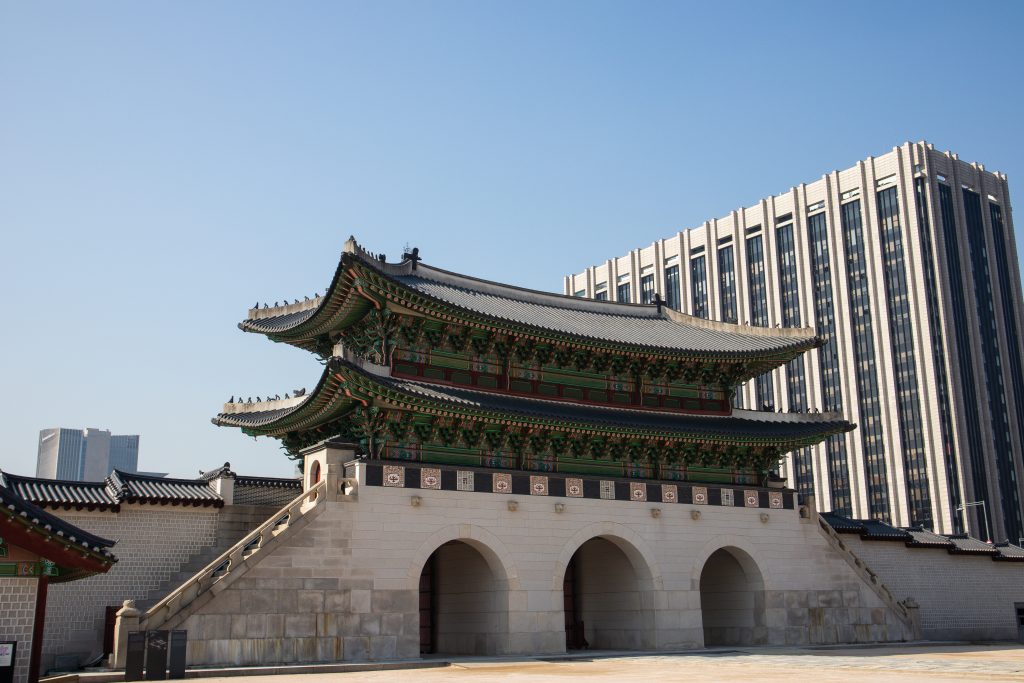
What You’re Entitled to when Working in South Korea
South Korean law requires Hagwons and Public Schools to provide some benefits you might not be aware of. For example:
- Labor contracts are mandatory (employers may be penalized up to 5 million KRW for failing to provide one), and must be written in Korean and English to be valid for foreigners.
- Wages, working hours, holidays and paid annual leave must be specified in writing.
- Your employer is legally obligated to provide four kinds of insurance (4대보험) including, health (건강보험), employment (고용보험), pension (국민연금) and occupational health and safety (산재보험).
- After three months (수습기간 or training period), the company must provide a month’s notice before firing you.
- Unemployment (실업급여) if you are fired after the three month training period.
- Overtime pay above contracted work hours (common at hagwons, but uncommon for salaried workers at companies) 50% higher than your hourly rate.
- One month’s severance pay for every year worked at a company regardless of nationality or labor status (even illegal workers are entitled to severance pay). Must be paid within 14 days after end of employment.
- You must be reimbursed for pension payments you contributed.
- It’s illegal to penalize you financially by deducting recruiter fees or plane ticket costs from your pay when you quit (make sure this isn’t included in your contract).
Korean Labor Contract Essentials
Korean labor contracts must include the following:
- Work conditions such as when you start working, location of the workplace and job description
- Labor contract details such as work hours, break hours (30 minute break for every 4 hours or 1 hour for every 8 hours worked by law), days off and pay day
- 15 days of paid annual leave when 80% of contracted work days per year are completed (one day of annual leave is added per year worked). Even after one month, you’re entitled to one day of paid leave.
- Health insurance must be included.
- Signature of employer and employee
What Korean Private English Academies (Hagwons) and Public Schools Usually Provide
- 2 to 2.5 million KRW a month for 30 teaching hours a week (hagwons).
- 1.8 to 2.2 million KRW a month for 22 hours a week (public schools).
- Housing or housing allowance (around 400,000 KRW per month).
- 1 week of training (public schools) or a few days of shadowing another teacher (hagwons).
- 10 days of vacation a year (hagwon) or one to two months of vacation (public schools).
- Flight ticket to and from Korea (if you’re already in the country, many places offer a one-way ticket.)
- Overtime pay above contracted work hours.
What isn’t Specified in Korean Labor Law
- What happens when you break an employment contract
- Does your employer have to sign a Letter of Release (some have said they have to and some claim that they don’t)
- How many sick days are provided (depends on the company)
***Update 2023***
In the event that you break a labor contract with a sponsored visa such as E-2, you can reapply immediately without a letter of release if you leave the country, instead of waiting for the current contract to expire. It’s unclear when this changed or if it was always this way. It helps to check since Korean immigration laws are unclear.
***
The Korean government is actively improving work conditions and favors workers over companies. You can expect conditions to continue to get better.

A Brief History of Korean Labor Movements
The first Korean labor union was the Seongjin Stevedores Union (성진본정부두조합), formed in 1898 by 46 workers.
More labor unions were established throughout the country, including the joint labor union organized in Gunsan in 1899. Labor unions in the early days were more of an enlightenment organization for workers to share ideas. The concept of workers’ rights was very new to Korea, which was a feudalistic society during the Joseon Dynasty only a few years prior.
In the 1930s, labor unions evolved into an armed struggle against Japanese imperialism.
Korean labor conditions improved further thanks to Jeon Tae-il (전태일), a sewing worker and workers’ rights activist who committed suicide by self-immolation at the age of 22 during a protest in 1970.
Even today, you can see labor unions struggling for better pay and conditions throughout Yeouido and Gwanghwamun.
What to do if you Need Help with Korean Labor Laws
- Don’t panic or get confrontational. Korea is safe and employers tend to not seek reprisal. Intimidation usually stops at the verbal level if you avoid escalation.
- Document everything you can and get your employment contract in Korean and English.
- Ask a Korean friend or acquaintance for quick advice. There are good people who want to help. Koreans tend to care about their national image and will generally go out of their way to help you.
- Go to a Labor Board office near you. There’s a higher chance of your officer speaking English in areas with a high concentration of foreigners. But, you might be limited to the region where your place of employment is located.
- If you can’t speak Korean well, try to bring a local friend.
- Present the documents and situation as clearly as you can.
- Follow the instructions of the officer.
- When in doubt, hire an attorney who practices labor law. Make sure they have no connection to your employer.
- Know when to cut your losses. If your issue is minor or hard to prove, it might be better to take it as a learning experience and get on with your life.
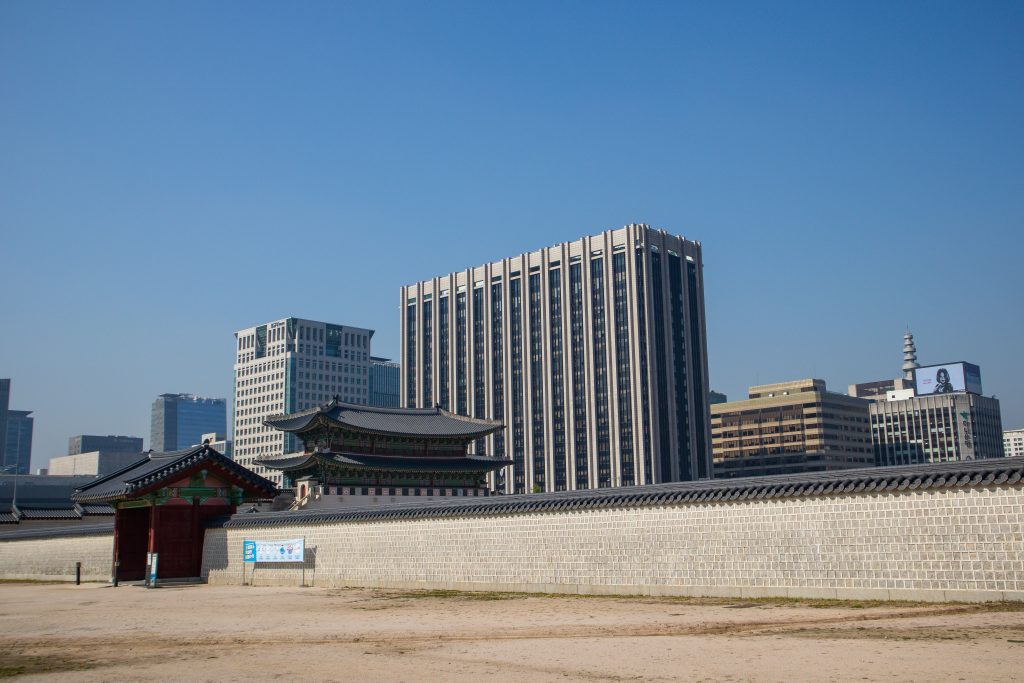
My Experience with Korean Labor Laws
I worked at a few Korean companies over the course of ten years. The first time I went to the Labor Board in 2006 to ask if a contract clause was legal, the representative called my boss in front of me. That made for an awkward afternoon back at work.
The second time I went in 2013, they helped me get my severance pay in a few days.
More about living in South Korea as an Expat
Labor rights have improved over the years, but it still can be a toss up whether you’ll get results.
The biggest takeaway is to go to the labor board if a result is taking longer than a week. The reason being that things move fast once decision makers sign off. Things taking longer than a week often means someone’s stalling for time.
Teaching English Abroad
TEFL certifications aren’t necessary to teach English in Korea. But, if it’s your first time and want some experience before jumping in, these programs are the most reputable.
Best All Around
International TEFL Academy is a good choice if you prefer to learn in-person and want more practice time.
Best for Budget and Convenience
The TEFL Org is the most reputable program for the price among the ones I’ve researched. They have a variety of courses and locations around the world, but their virtual classroom is where they really shine.
FAQ
Do Korean labor laws apply to foreigners?
Yes. Korean labor laws apply not only apply to citizens, but also to foreign workers.
Do Korean labor laws protect workers?
Yes and they’re getting better every year. For example, employers must now give 30 days notice before firing someone or they must pay a month’s salary.
When was the first labor union formed in South Korea?
The Seongjin Stevedores Union of 46 workers was formed in 1898.
Did we miss anything?
Labor rights in South Korea are improving.
Let us know your thoughts in the comments below!
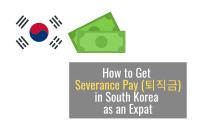
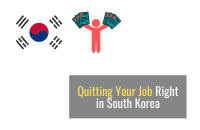
Hello,
Could you expand on “You must be reimbursed for pension payments you contributed”? I know for my friends who left the country, their pension account was closed and the funds returned to them; however, for those who are still here working, they didn’t get their pension contributions reimbursed when they resigned. And am I correct in thinking that the reimbursement isn’t provided by the employer?
Thank you. I’m so glad I came across your website; it’s very informative and every expat working here should know it.
Hi Jo,
Thanks for the kind words.
You can get your pension contributions when you return to your home country, not when you resign.
Yes, you’re correct. The reimbursement is conducted by the National Pension Service.
They now offer an Incheon Airport payment service if you claimed 외국인 반환일시금(lump sum refund for foreigners) and selected this option.
Of course, it has some conditions/rules and hoops to jump through, but you should be able to receive payment in 15 currencies, including USD, EURO, etc.
hi there, I noticed you said that a contract must include 15 days of annual leave but then you say that private schools usually offer 10 vacation days. are these separate types of leave or so? thank you!
Hi, that’s a good catch. There are many inconsistencies between the law and reality. The full wording of the law is,
“An employee who works a full year is entitled to 15 days of annual paid leave. An employee who has not completed a full year of work, or has a less than 80% attendance rate in a year, is entitled to one day of annual paid leave for each full month of employment with perfect attendance.”
So make of that what you will.
It might have something to do with the winter and summer vacations which are paid without working. This really depends on the school though, so make sure to ask.
Hi there! Can you go into a little more detail about discriminatory practices and if there are ways to protect myself in the future? I am proudly type 1 diabetic, am in excellent control (I’ve lived with it for 25 years), and have lived in Korea long term before while doing both graduate school and intensive advanced Korean language. It has never affected my work, but the one time I interviewed at a shady hagwon and decided to be honest, they had already sent the contract and decided to rescind it due to my condition.. So my recruiter is telling me to go so far as to hide it, but this isn’t something you hide, nor is it safe to hide. And I definitely don’t want to be withholding from Immigration. So I’m looking everywhere for advice. I also saw a recent job posting that mentioned “as per Korean law pictures were not to be included in the application” or something to that effect. So I have hope it’s changing.
Hi Chelé,
That’s a good question. AFAIK, employers aren’t allowed to discriminate based on health conditions. Also, you shouldn’t have to do anything that would risk your health. I would speak with someone from the labor board about your situation to be sure. Best of luck!